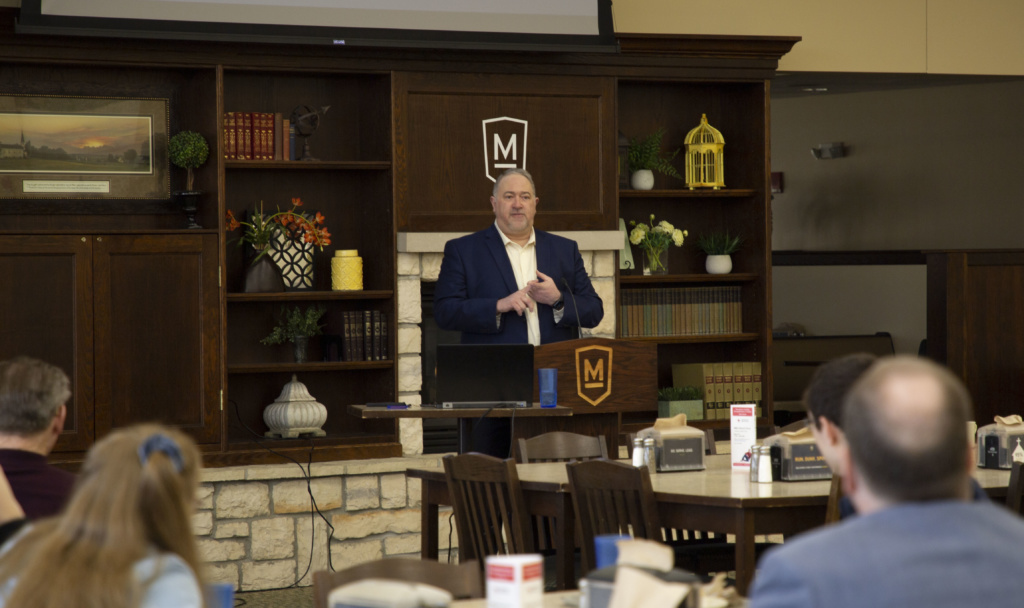Safe and Sustainable Energy for the Future | MBU Business Breakfast
Maranatha faculty, students, and several businesspeople from the community gathered on March 9, 2021, to hear Brent Ridge, President and CEO of Dairyland Power Cooperative present “Safe and Sustainable Energy for the Future.”
Ridge began his presentation by introducing Dairyland Power Cooperative. Headquartered in La Crosse, Wisconsin, Dairyland is responsible for providing wholesale power to their 24 member distribution cooperatives and 17 municipal utilities. The company provides energy to 600,000 people, maintains 3,176 miles of transmission lines, 44,500 square miles of service area, and employs 545 people. Dairyland has $1.36 billion in total assets.
Ridge continued his presentation by explaining some terms that would be key to understanding the rest of the presentation. On a normal day, there are four levels of energy source: the base load (coal, gas, nuclear), the intermittent renewables (wind, solar), natural gas (plants that can start and ramp up quickly), and the market. The base load is dependable while there are spikes and peaks in intermittent renewable energy. When the spikes and peaks happen, the market steps in and helps maintain consistency.
The Midcontinent Independent System Operator (MISO), Ridge shared, is an independent, non-profit organization that delivers safe, cost-effective electric power across 15 U.S. States and the Canadian province of Manitoba.
As of today, almost 60% of the world’s energy source production and 62% of the U.S. energy source production is from fossil fuels. Dairyland Cooperative currently produces energy that is 70% from coal. But between now and 2030, the company plans to bring that down to 43%. While it may seem like a long time, “we have to be very measured and thoughtful about how we manage our carbon production,” Ridge stated. He emphasized that any transition needs to be made slowly, methodically, and responsibly.
There are two risks of decarbonization that Ridge discussed: (1) loss of reliability and (2) increased cost. While companies work steadily toward diversification goals, they must be conscious of reliability, affordability, and community sustainability. The base resources like coal, gas, and nuclear run 24/7. It is not currently possible to maintain reliability on renewable sources alone.
“[Energy] is not something we should take for granted,” Ridge stated. “We can’t keep the lights on today without a serious nod towards those base load resources.”
Ridge wove the recent Texas weather crisis throughout the presentation. He stated that simply put, what happened was the demand for energy went way up due to the extreme weather conditions and supply went way down. The market could not keep up.
He then compared what was happening in Wisconsin in February 2021. On a fair-weather day (mid-50s temperatures), 57% of electricity was produced from coal and gas. But on a severe weather day (negative temperatures), 77% of the energy was produced from coal and gas. Those base load resources were key to keep Wisconsin functioning.
What is Dairyland’s approach to decarbonization? “We call it ‘Sustainability,’” Ridge stated. Sustainability is a four-pronged approach; it is analyzing the financial, environmental, social, systems, and equipment impact on the company and the consumer. “This is an all-of-the-above approach,” Ridge continued.
The “all-of-the-above” approach considers that nuclear energy is going to be a major part of the picture in 50 years. While the investments will trend towards renewable energy, coal, oil, and gas will be the bridge to the future.
“The energy system is incredibly complex, and if we’re going to move to a decarbonization future, we need an all-of-the-above, methodical approach,” Ridge stated.
Ridge opened the floor to questions and comments at the end of the presentation. Several attendees started discussions on what Watertown can do to decarbonize, solar energy in Wisconsin, nuclear and coal plants, renewable energy credits (RECS), solar-powered satellites, viable batteries for solar sustainability, the severe weather in Texas, and wind energy.
You can view the presentation and Q&A time here.
The next Business Breakfast will be hosted on April 20, 2021, with guest speaker, MBU alumnus, Tom Allen (’92), Head Football Coach at Indiana University. Register now.


